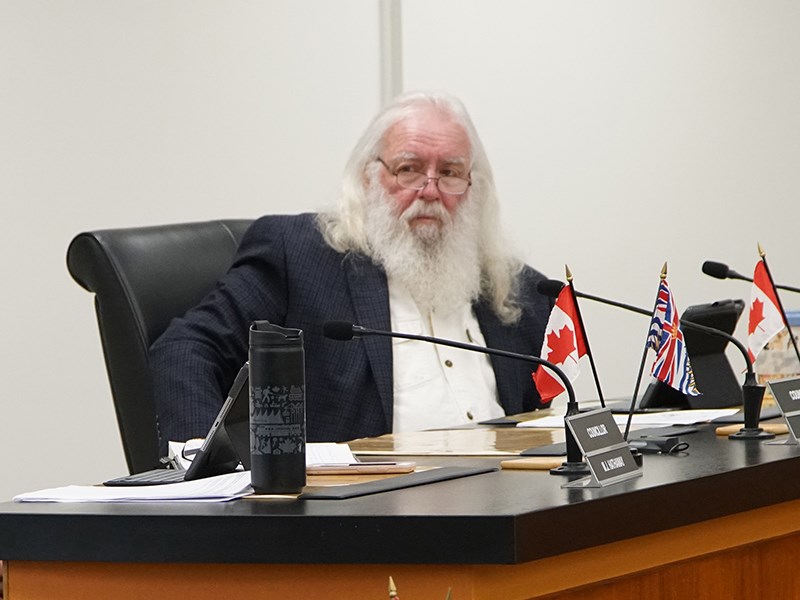City of Powell River Council has discussed the deluge of correspondence it received regarding the commercial use of water in the city.
At the June 18 city council meeting, mayor Dave Formosa said the city received a number of letters about a suggestion staff had presented on how a bylaw regarding water bottling could be created.
Councillor George Doubt said he spent considerable time going through the letters. He said while many came prior to the June 11 council meeting, he was glad council didn’t try to deal with them then, because it gave him time to read all of them.
He said in council’s June 18 agenda package, there were about 386 pages of correspondence received from residents regarding the issue.
Doubt said he read all of them and tried to determine the most frequent concerns.
“Far and away, plastic bottles were the number one concern,” said Doubt. “People don’t want plastic water bottling and they don’t want trash from single-use plastic items.”
Doubt said the next concern expressed was the perception council was selling the water and council should not allow privatization of water. Other concerns were that council should not issue water licences, and should ban the sale and export of water.
“No one wants the jobs; there were quite a few emails saying exactly that,” said Doubt. “Many of the emails were saying we should include surface water in the discussion.”
Many people mentioned communication, suggesting there was some kind of conspiracy or backroom dealing going on, said Doubt.
“People are looking for transparency,” he added.
Doubt said council received a request some time ago from a Vancouver Island delegation to regulate groundwater bottling to protect the aquifers because they were afraid people would be taking water out of wells and trucking it to Powell River to bottle it. He said the delegates were hoping Powell River would pass bylaws preventing that from occurring.
“City council thought about that and asked for a staff report about what we could do,” said Doubt. “Council received the staff report, which was asking for more guidance from council. Council asked staff for a report on the options for creating a bylaw.
“Staff brought back a report with three options. One was to simply ban bottling of city water, the other was to ban groundwater bottling and the other one was to include surface water. Council made one choice on one of those options and asked staff to draft a proposed bylaw amendment.”
Doubt said that resulted in Facebook discussions, a Peak article, a lot of discussion in the community and a motion that came to council the previous week to reconsider its motion to ask staff to draft a proposed bylaw.
He said council didn’t vote to sell any water, to issue any surface water licences, to issue any groundwater licences, nor did it endorse bottling of surface water or any kind of water.
“What we were doing was attempting to make a motion to protect groundwater from harvesting and bottling within our city limits,” said Doubt. “I thought that was a good thing for city council to do. Most of the people on council thought it was as well.
“If we fell short in what the public wants us to do, we didn’t go far enough. We have plenty of time to correct that.”
Doubt said he understands there is a desire among the people who wrote in to include surface water, regardless of whether that costs jobs in the future or not.
He said council has been transparent.
“We publish our agendas well before every meeting and we give everyone the opportunity to come and get their point of view across,” said Doubt.
Doubt made a motion to receive the emails for information.
Councillor CaroleAnn Leishman said she wanted to thank people who took the time to write regarding the issue.
“I am personally quite grateful the community was concerned,” said Leishman.
Formosa said when the delegate came from Vancouver Island, everyone on council agreed extracting water from aquifers for water bottling is not what is wanted.
“We supported that movement,” said Formosa.
He said the Union of BC Municipalities made a motion to protect groundwater and when it went to the provincial government, the province said no.
Formosa said subsequently, the delegate asked that the city take it further to encompass all water bottling.
“I spoke up at the time to let people know we had an enquiry from a company extracting water from the waterfalls at Toba Inlet, and the water is leaving those falls and they go to Annacis Island and they get bottled,” said Formosa. “We had an enquiry about the possibility of bottling that water here. I said sure, when the time comes, but I did say that if you want to use plastic, you won’t be welcome here.”
The company had further discussions with the mayor and talked about establishing a plant here, with 25 to 30 jobs, starting at $23 an hour and going up to $40 an hour.
“I know jobs are hard to come by in Powell River and I support the fact that we are not fooling with aquifers,” said Formosa. “I made it known there may be a possibility. Instead of hauling the water to Vancouver and burning the greenhouse gases, why can’t they stop here and manufacture here and create some work? I support that.”
Formosa said there is a philosophy among a number of Powell River residents where the issue is not just about groundwater anymore, it’s about water, period.
Council voted to receive the letters for information.



